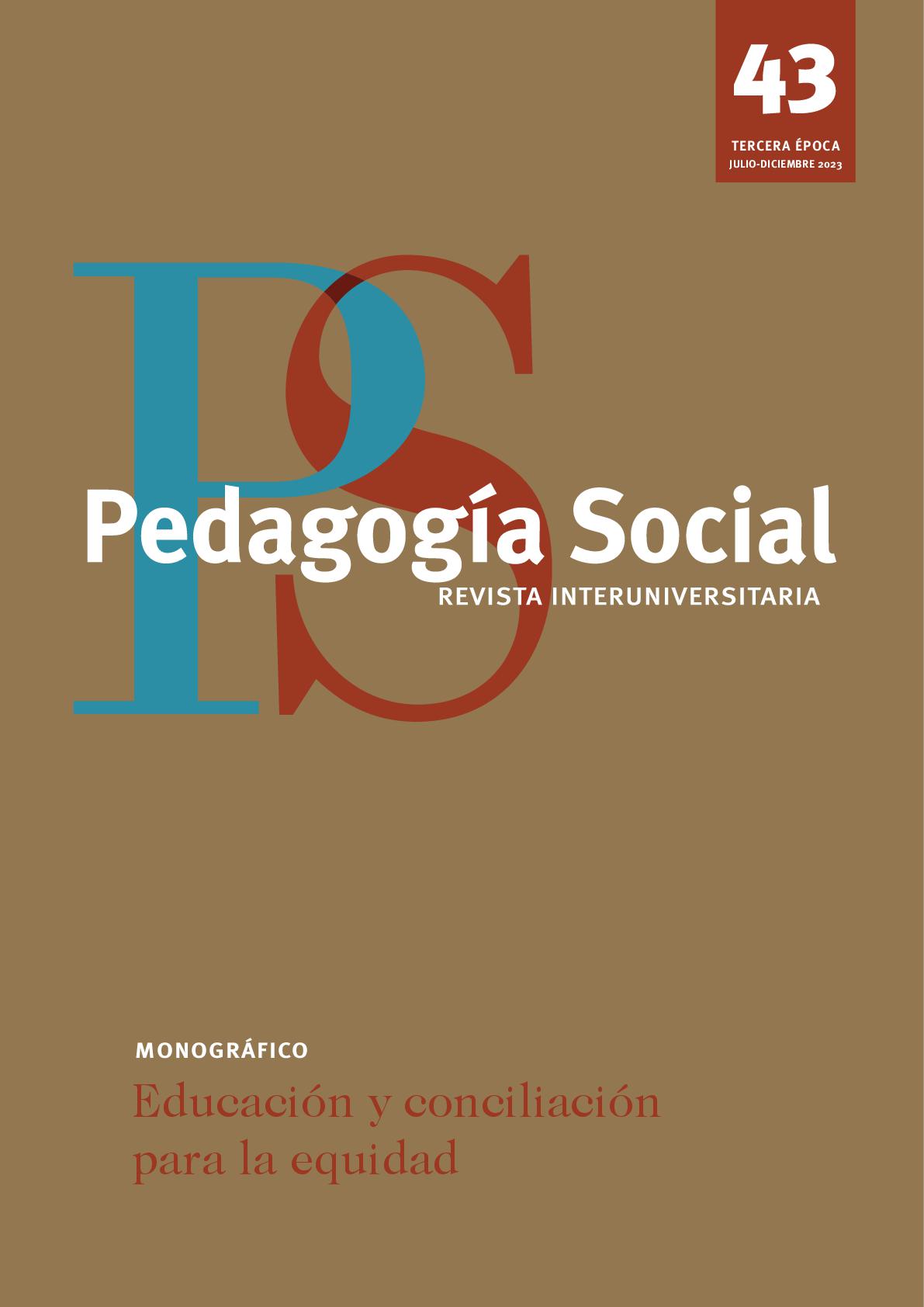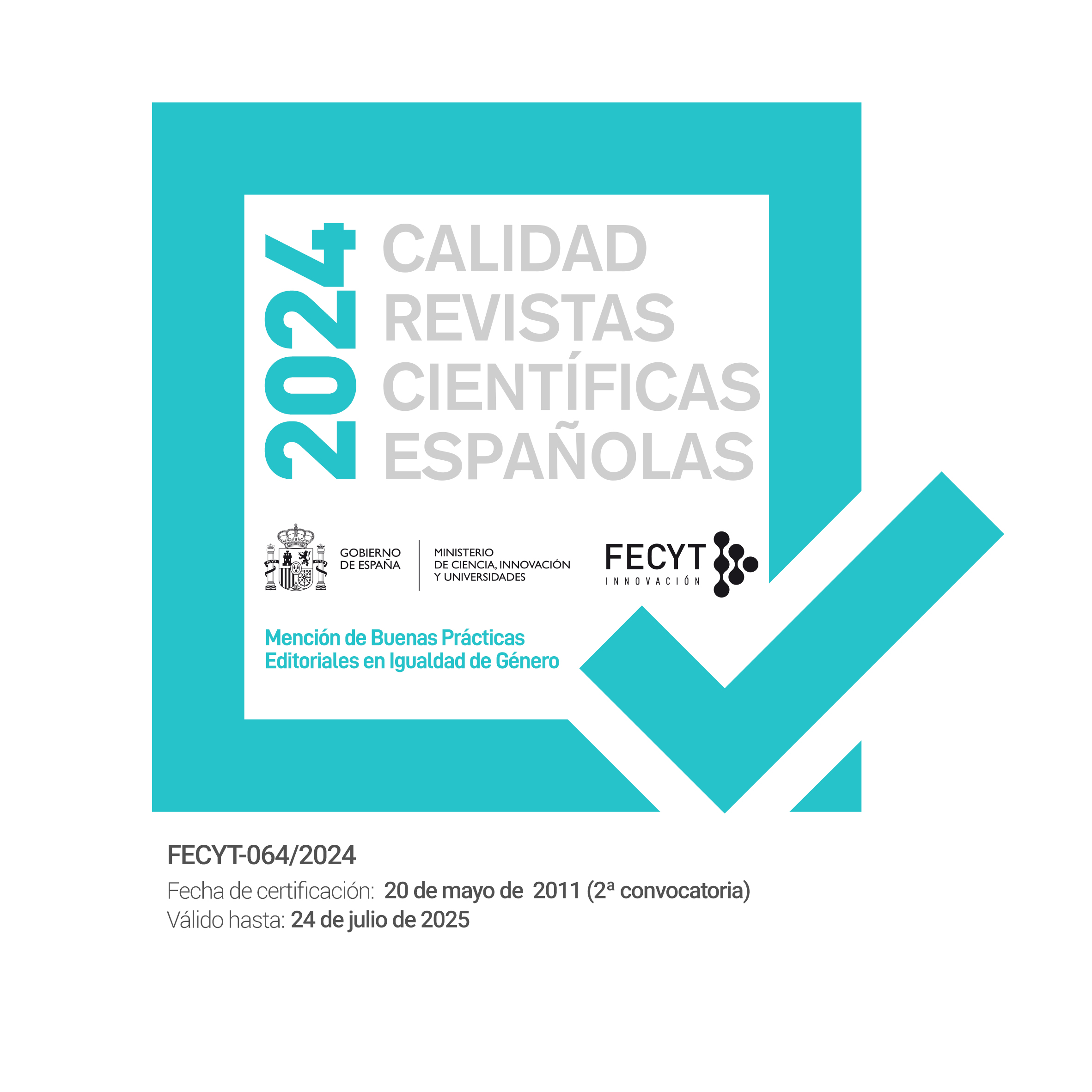Family reconciliation of daily life with children in primary education: impacts of confinement
DOI:
https://doi.org/10.7179/PSRI_2023.43.02Keywords:
use of time, co-responsibility, leisure, family, lockdownAbstract
The forced confinement due to COVID-19 had a strong impact on the organization of citizens’ time, changed daily routines and posed important challenges for families. Thus, the aim of this paper is to analyze the reality of the work-life balance of families with children attending primary school in Spain, focusing on their main difficulties and on the study of family leisure time during this period. For this purpose, a descriptive quantitative methodology was used, making use of an ad hoc questionnaire applied telematically throughout the national territory. A total of 1,309 valid cases were obtained. The main results reveal that almost half of the participants felt that the reconciliation of their time worsened during confinement, with women being the ones who mostly saw their personal time reduced in order to attend to their different work and family responsibilities. Accompaniment in the completion of homework was the factor that most limited the management of family time and in which women were much more involved than parents, causing deep dissatisfaction in them as a result of the lack of time. For its part, confinement also influenced family leisure. During this period, families increased the time dedicated to sharing recreational activities, especially on weekends. In addition, they attached great importance to these shared times, claiming to have enjoyed them, which has had an impact on their personal growth. In conclusion, confinement had a significant and negative impact on the reconciliation of the families’ daily schedules, especially that of the mothers, and showed the importance of recovering time for shared family leisure.
Downloads
References
Alcañiz, M. (2015). Género con clase: la conciliación desigual de la vida laboral y familiar. Revista Española de Sociología, 23, 29-55. https://recyt.fecyt.es/index.php/res/article/view/65362
Andrés, C., Rodrigo, M. P. y Valdivia, P. (2021). El ocio en la primera infancia desde un enfoque humanista en tiempos de pandemia. EDETANIA, 60, 143-164. https://doi.org/10.46583/edetania_2021.60.947
Balbo, L. (1978). La doppia presenza. Inchiesta, 32.
Belmonte, M. L., Álvarez-Muñoz, J. S. y Hernández, M. Á. (2021a). Beneficios del ocio familiar durante el confinamiento. Psicoperspectivas, 20(3), 1-13. https://dx.doi.org/10.5027/psicoperspectivas-Vol20-Issue3-fulltext-2364
Belmonte, M .L., Álvarez, J. S. y Hernández-Prados, M.ª Á. (2021b). TIC y ocio familiar durante el confinamiento: agentes involucrados. Texto libre: linguagem e tecnología, 14(2), 1-14. https://doi.org/10.35699/1983-3652.2021.33938
Buitrago, F., Ciurana, R., Fernández, M. C. y Tizón, J. L. (2020). Pandemia de la covid-19 y salud mental: reflexiones iniciales desde la atención primaria de salud española. Atención primaria, 53(1), 89-101. https://doi.org/10.1016/j.aprim.2020.06.006
Caballo, M. B., Varela, L. y Martínez, R. (2020). La educación familiar del ocio: una responsabilidad compartida. En J. A.
Caride, M. B. Caballo y R. Gradaílle (Coords.), Tiempos, educación y ocio en una sociedad de redes (pp. 123-138). Octaedro. https://doi.org/10.36006/16264-07
Camarillo, L. N., Stodolska, M. y Berdychevsky, L. (2020). Leisure among second-generation Mexican-American youth residing in underprivileged communities in Southern California. Leisure Sciences, 45(2), 199-218. https://doi.org/10.1 080/01490400.2020.1813664
Cardús, S., Pérez, C. y Morral, S. (2003). Propostes d’intervenció per a la conciliació d’horaris familiars, escolars i laborals. Informe final. Generalitat de Catalunya.
Carrasco, C. (2013). El cuidado como eje vertebrador de una nueva economía. Cuadernos de Relaciones Laborales, 31(1), 39-56. https://doi.org/10.5209/rev_CRLA.2013.v31.n1.41627
Carrasquer, P. (2013). El redescubrimiento del trabajo de cuidados: algunas reflexiones desde la sociología. Cuaderno de Relaciones Laborales, 31(1), 91-113. https://doi.org/10.5209/rev_CRLA.2013.v31.n1.41633
Cuenca, M. (2014). Ocio Valioso. Documentos de Estudios de Ocio, 52. Universidad de Deusto.
Fernández, M-J., Pérez, L. y Sánchez, S. (2021). Escuela pública y COVID-19: dificultades sociofamiliares de educación en confinamiento. Publicaciones, 51(3), 463-479. https://doi.org/10.30827/publicaciones.v51i3.15981
Fernández-Río, J., López-Aguado, M., Pérez-Pueyo, A., Hortigüela-Alcalá, D. y Manso-Ayuso, J. (2021). La brecha digital destapada por la pandemia del coronavirus: una investigación sobre profesorado y familias. Revista Complutense de Educación, 33(2), 351-360. https://doi.org/10.5209/rced.74389
Fernollar-Cortés, J., Jiménez, O., Ruíz-García, A. y Resurrección, D. (2021). Gender Differences in Psychological impact of the confinement during the covid-19 outbreak in Spain: a longitudinal study. Frontiers in Psychology, 12, 682860. https://doi.org/10.3389/fpsyg.2021.682860
Fuentes-Peláez, N., Rabassa, J., Crous, G. y Lapadula, M. C. (2022). El impacto de la pandemia del Covid-19 en las necesidades de los niños, niñas y adolescentes y sus familias en situación de riesgo en la provincia de Barcelona. Sociedad e Infancias, 6(1), 55-66. https://doi.org/10.5209/soci.78274
Gálvez, A. y Tirado, F. J. (2013). Conciliación y género. En B. Cavia, A. Gálvez, M. Martínez y F. J. Tirado (Comps.), Génere i treball. Universitat Oberta de Catalunya.
García, C. (2017). El impacto de la crisis económica en la pobreza de tiempo y la desigualdad de género. Arbor, 193(784): a382. https://doi.org/10.3989/arbor.2017.784n2005
González, M. J. y Cuenca, C. (2020). Pandemia sanitaria y doméstica. El reparto de las tareas del hogar en tiempos del Covid-19. Revista de Ciencias Sociales, 26(4), 28-34. https://doi.org/10.31876/rcs.v26i4.34644
Gottzén, L. (2009). Managing Time and childcare in dual-earner families: unforeseen consequences of household strategies. Acta Sociologica 52(2), 162-175. https://doi.org/10.1177/0001699309104003
Haar, J. M., Ruso, M., Suñe, A. y Ollier-Malaterre, A. (2014). Outcomes of work–life balance on job satisfaction, life satisfaction and mental health: A study across seven cultures. Journal of Vocational Behavior, 85, 361-373. https://doi.org/10.1016/j.jvb.2014.08.010
Harrington, M. (2014). Practices and meaning of purposive family leisure among working– and middle-class families. Leisure Studies, 34(4), 471-486. https://doi.org/10.1080/02614367.2014.938767
Hodge, C., Bocarro, J. N., Henderson, K. A., Zabriskie, R., Parcel, T. L. y Kanters, M. A. (2015). Family leisure. Journal of Leisure Research, 47(5), https://doi.org/10.18666/jlr-2015-v47-i5-5705
Imbernón, F. (2020). Educació a casa més enllà del cofinament. Anuari de l’Educació de les Illes Balears, 2020, 396-401.
Izquierdo, M. J. (1998). El malestar en la desigualdad. Cátedra.
Janssens, A. (1997). The rise and decline of male breadwinner family? An overview of the debate. International Review of Social History, 42(S5), 1-23. https://doi.org/10.1017/S0020859000114774
Jiménez, A. y Gómez, V. (2015). Conciliando trabajo-familia: análisis desde la perspectiva de género. Diversitas: Perspectivas en Psicología, 11(2), 289-302. https://doi.org/10.15332/s1794-9998.2015.0002.09
Jiménez, A. y Moyano, E. (2008). Factores laborales de equilibrio entre trabajo y familia: medios para mejorar la calidad de vida. Universum, 23(1), 116-133. https://doi.org/10.4067/S0718-23762008000100007
Lewis, H. (2020, marzo 19). The coronavirus is a disaster for feminism. Pandemics affect men and women differently. The Atlantic. https://www.theatlantic.com/international/archive/2020/03/feminism-womens-rights-coronavirus-co-vid19/608302/
Manzano-León, A., Rodríguez-Ferrer, J. M., Aguilar-Parra, J. M. y Herranz-Hernández, R. (2021). Gamification and family leisure to alleviate the psychological impact of confinement due to COVID-19. Children & Society, 36(4), 433-449. https://doi.org/10.1111/chso.12495
Méda, D. (2002). El tiempo de las mujeres. Conciliación entre la vida familiar y profesional de hombres y mujeres. Narcea.
Moreno, A. (2011). La conciliación laboral y familiar en el modelo de flexiguridad en España desde una perspectiva de género. Comunitania. Revista Internacional de Trabajo Social y Ciencias Sociales, 1, 89-111. https://doi.org/10.5944/comunitania.1.5
Moreno, S.; Ajenjo; M. & Borrás, V. (2018). La masculinización del tiempo dedicado al trabajo doméstico rutinario. Revista Española de Investigaciones Sociológicas, 163, 41-58. https://doi.org/10.5477/cis/reis.163.41
Obiol, S. (2012). El cambio familiar y el proceso educativo. En J. Beltrán y F. J. Hernández (Coords.), Sociología de la Educación (pp. 75-99). McGraw-Hill.
Ochoa, M. R. (2020). Conciliación familiar y laboral en Lekumberri/Larraun. Una aproximación etnográfica. Universidad Pública de Navarra.
OIT (2009). Trabajo y familia: hacia nuevas formas de conciliación con corresponsabilidad [PDF]. https://www.ilo.org/wcmsp5/groups/public/---dgreports/---gender/documents/publication/wcms_111376.pdf
Papí, N. (2008). La conciliación de la vida laboral y familiar como proyecto de calidad de vida desde la igualdad. Revista Española de Sociología, 5, 91-107.
Rimbau-Gilabert, E. (2020). ¿Cuál es el posible efecto del teletrabajo preferente sobre el reparto de tareas domésticas entre hombres y mujeres? Noticias Cielo, 5, 1-5. [PDF] http://www.cielolaboral.com/wpcontent/uploads/2020/05/rimbau_ noticias_cielo_n5_2020.pdf
Ritz, M. (2020). Aprendizajes de las medidas de conciliación europeas con enfoque de género frente a la Covid-19. EUROsociAL.
Rogero-García, J. (2020). La ficción de educar a distancia. Revista de Sociología de la Educación_RASE, 13(2) Especial, COVID-19, 174-182. http://dx.doi.org/10.7203/RASE.13.2.17126.
Ruíz-Frutos, C. y Gómez-Salgado, J. (2021). Efectos de la pandemia por Covid-19 en la salud mental de la población trabajadora. Archivos de Prevención de Riesgos Laborales, 24(1), 6-11. https://doi.org/10.12961/aprl.2021.24.01.01
Salido, O. (2007). La conciliación de la vida familiar y laboral en España: hacia un nuevo equilibrio de bienestar. En M. A. Carbonero y S. Levin (Comp.), Entre familia y trabajo: relaciones, conflictos y políticas de género en Europa y América Latina (pp. 277-306). Homosapiens.
Sanz, E., Sáenz de Jubera, M. y Cano, R. (2018). Actitudes de padres e hijos hacia un ocio compartido en familia. Pedagogía Social. Revista Interuniversitaria, 32, 59-70. https://doi.org/10.7179/PSRI_2018.32.05
Shannon, C.S. (2021). Constructing “family” leisure as a context for ‘doing’ and ‘displaying’ family. En D.E. Trussell y R. Jeanes (Eds.), Families, sport, leisure and social justice: from protest to progress (pp. 18-29). Routledge.
Tobío, C. (2005). Madres que trabajan: dilemas y estrategias. Cátedra.
Valdivia, N. (2018). Relación entre bienestar personal y conciliación laboral-familiar. [Trabajo Fin de Grado]. Universidad de Las Palmas de Gran Canaria. http://hdl.handle.net/10553/96853.
Williamson, M., Zabriskie, R., Townsend, J., Ward, P., Fellingham, G. y Kuznetsova, I. (2019). The contribution of family leisure to family functioning and family satisfaction among urban Russian families. Annals of Leisure Research, 22(1), 1-22. https://doi.org/10.1080/11745398.2019.1609367
Downloads
Published
How to Cite
Issue
Section
License

This work is licensed under a Creative Commons Attribution-NonCommercial-ShareAlike 4.0 International License.
Copyright and right to archive
The published version of the articles can be self-archived by their authors in open access institutional and thematic repositories. However, Pedagogía Social. Revista Interuniversitaria must authorize partial or global reutilisation on new papers or publications.
Published papers must be cited including the title of the journal Pedagogía Social. Revista Interuniversitaria, issue, pages and year of publication
Ethical responsibilities
Pedagogía Social. Revista Interuniversitaria does not accept any material that has been previously published in other documents or publications. Authors are responsible for obtaining the required permissions for partial or global reproduction any material from other publications, and to correctly quote its origin.
Pedagogía Social. Revista Interuniversitaria is obliged to detect and report fraudulent practices.
Only those who have intellectually contribute to the development of the paper must appear as authors.
The journal expects authors to declare any commercial partnership that might entail a conflict of interest with respect to the submitted article.
Authors must mention in the article, preferably in the “methodology” section, that the procedures used during the samplings and controls have been made after getting informed consent.
The journal will not use any received contribution in a way other than the goals described in these guidelines.
Copyright Notice
© Pedagogía Social. Revista Interuniversitaria. Papers published in both the printed and online versions of this Journal are property of Pedagogia Social. Revista Interuniversitaria, being required to cite the source in any partial or total reproduction.
Unless otherwise stated, all content of this electronic journal is distributed under "Creative Commons Attribution-Non commercial 3.0 Spain" (CC-by-nc) license for use and distribution. The informative version and the legal text of this license is available here. This has to be expressly stated in this way when necessary.






